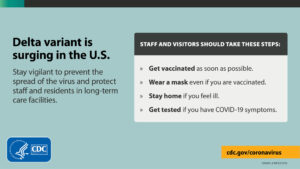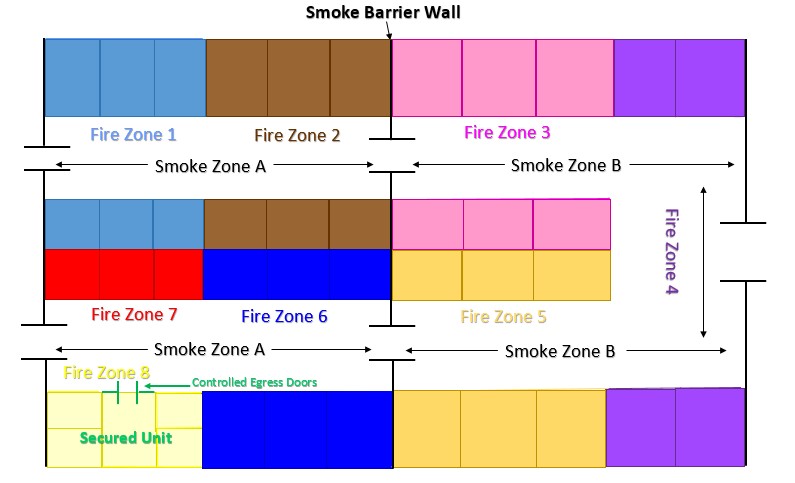Recently, NHSN launched two new questions in the weekly COVID-19 vaccination module. During the reporting week of 8/23/2021 through 8/29/2021, facilities began reporting on the number of individuals eligible to receive additional or booster doses of COVID-19 vaccine (question #4) and the number of individuals who received additional or booster doses (question #5).
Facilities should refer to the CDC’s Interim Clinical Considerations for Use of COVID-19 Vaccines Currently Approved or Authorized in the United States to determine which individuals are eligible to receive additional or booster doses. According to the current guidance, an additional mRNA COVID-19 vaccine dose is recommended for moderately to severely immunocompromised people after they completed an initial 2-dose mRNA vaccine series. Therefore, facilities should include the following individuals in question #4 as eligible to receive an additional dose of the COVID-19 vaccine:
- Received an initial complete 2-dose mRNA COVID-19 vaccine series at this facility or elsewhere since December 2020 (question 2); AND
- Eligible to receive an additional or booster dose of the COVID-19 vaccine, per CDC guidance noted above.
In response to questions, NHSN received about reporting additional COVID-19 vaccine dose or booster data, scenario examples are provided below to assist in determining how to respond to these new questions.
- Facility A is unsure how to determine who in their facility is considered eligible for an additional dose or booster at this time.
Facilities should refer to the CDC’s Interim Clinical Considerations for Use of COVID-19 Vaccines Currently Approved or Authorized in the United States to determine individuals who are eligible to receive additional doses or boosters after receiving an initial completed vaccination series. For more information about COVID-19 vaccine indications for individuals who are immunocompromised, please see the FAQs at: https://www.cdc.gov/vaccines/covid-19/clinical-considerations/immunocompromised.html.
- Facility B has a staff member who only received dose 1 of the Moderna COVID-19 vaccine. However, this staff member expressed an interest in receiving an additional dose of the vaccine.
The facility would not include the staff member in questions 4 and 5 on the data collection form since he/she did not complete an initial COVID-19 vaccination series.
- Facility C cannot determine if an individual is eligible for an additional dose at this time because they do not know the individual’s health status to determine if they are immunocompromised.
If a facility is unable to determine whether an individual is considered eligible to receive an additional dose or booster at this time, the individual should not be reported in question 4 or question 5 on the data collection form.
For reporting through the NHSN COVID-19 vaccination modules, assume these two staff members were eligible to have received an additional dose of the COVID-19 vaccine. Include these two staff members in question 4 and question 5 of the data collection form.
- After reviewing the current Interim Clinical Considerations for Use of COVID-19 Vaccines, facility E does not have any individuals who are eligible to receive an additional dose or booster of COVID-19 vaccine.
This facility should report that zero individuals are eligible to receive an additional dose or booster of COVID-19 vaccine in question 4. The new question 4 and question 5 on the data collection form are required fields. A value must be entered for each of these questions for the form to be saved successfully. A zero (“0”) should be entered for question #4 and a zero “0” entered for question #5 (select any manufacturer from the dropdown). This will allow the form to save successfully.
Updated resources, including training materials, data collection forms, table of instructions documents, and other supporting materials are available on the following webpages:
Weekly HCP & Resident COVID-19 Vaccination | LTCF | NHSN | CDC
Weekly HCP COVID-19 Vaccination | HPS | NHSN | CDC
Weekly Patient COVID-19 Vaccination | Dialysis | NHSN | CDC
Frequently asked questions (FAQ) have also been updated (please see questions 23-27) and can be accessed using this link: https://www.cdc.gov/nhsn/hps/weekly-covid-vac/faqs.html.
We appreciate your efforts to report these critical data accurately and completely. We encourage updates to previously entered data as needed. If you have any questions or concerns, please let us know. As always, questions can be sent to NHSN@cdc.gov using ‘COVID-19 vaccination’ in the subject line of the message.



